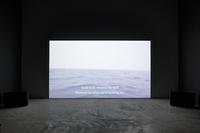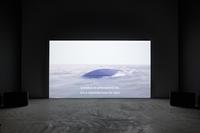Taus Makhacheva: Baida
Baida is a video recording of a performance that took place at the 57th Venice Biennale in 2017.
The work – an ironic critique of the context of art shows – is based on a series of conversations held by the artist with fishermen from the village of Staria Terek on the Caspian Sea coast. Ironically, a recurring motif in their stories is not the natural fear of drowning, but that their bodies will never be found if there is an accident at sea. That is why the men tie themselves with ropes to the bow of the boat (in Dagestan, the term baida means a flimsy boat) to enable their families to mourn them if they drown. The work reflects on the precarious existence of fishermen struggling to survive in overwhelming natural and economic conditions. At the same time, however, it responds to the exaggerated expectations of biennial show visitors concerning the spectacularity of the exhibited artworks.
In the Baida video, focusing specifically on the water surface all around and not the actors themselves who are sailing on the boat, we hear a conversation between three visitors to the Biennale. Although their conversation occasionally strays to the work and background of the artist, more often than not they talk about actually rather preferring to go back to land and have dinner with friends, or, as a digestive, finally enjoy some more overt forms of artistic production. The crew are presumably contemporary art curators who, in rather inclement weather, are being guided by GPS coordinates to the open sea where the performance is supposed to take place. We feel like we are sailing with them on the boat, having small talk in anticipation of the artwork, trying to recognize it on the empty water surface.
In fact, what opens up before us is an endless sea, where there may be many invisible ships and many invisible people. Something is happening that seemingly does not concern us at all – us, the visitors to the Venice Biennale. But apart from this performance, shows are held every day and not only on the waters of the Adriatic Sea. In the same waters where the governments of European countries refuse to send their boats to rescue drowning migrants. The invisible people, their invisible boats and, above all, the impossibility of pointing out their helplessness. It is indeed difficult to avoid speculation here. Nor do we see our disappointed commentators who, having found only a capsized boat without performers, on their way back have to reflect on the precariousness of human lives struggling to survive in devastating conditions, and hoping to find themselves back in their familiar and seemingly safe institutional comfort as soon as possible.
However, the performance itself and the video are fiction. The boat was filmed in Dagestan and not in the waters of the Venetian Lagoon, the performers act on the basis of a credible script, the voices of the curators’ characters were recorded by actors in a London studio. But even without revealing the behind-the-scenes of this video, we are certainly left with the aftertaste of our own attitude towards what happens when hierarchy, culture and tradition get into conflict with each other. Should we be shocked, feel guilty and then numb in our perception of events, images, objects and bodies in a globalised reality?
Daniela and Linda Dostálková
Taus Makhacheva lives and works in Moscow. Her artistic practice is influenced by her birthplace, Dagestan, where she grew up. She studied at the Goldsmiths Fine Art in London (2007), the Institute of Contemporary Art in Moscow (2009) and the Royal College of Art in London (2013). She works predominantly with the media of video and performance, and is characterised by a playful sense of irony and satire that she finds in clashes of cultures and traditions. Taus Makhacheva’s work often draws on told and lived stories or shared experience; she transforms them into new narratives and their reconstructions. She finds new settings and imaginative assignments for her actors, who are often tightrope walkers, magicians, ventriloquists, jewellers, architects or writers. With each project, she seeks to explore and develop ways of understanding stories and ideas through a collective approach. For some of her performances, Taus Makhacheva uses an alter ego, Super Taus. Super Taus, who is Taus Makhacheva’s super hero alter-ego (or perhaps vice-versa) lives and works in Tsada Mountain village, having graduated from the Department of Philology at Dagestan Pedagogical State University. She considers her actions “life-affirming practices”. Taus Makhacheva has won a number of prestigious awards, including, among others, “New Generation – Innovation” State Prize, Moscow (2012); “Future of Europe” Prize, Museum of Contemporary Art, Leipzig (2014); 6th Moscow Biennale of Contemporary Art Foundation Prize, Moscow (2015); Kandinsky Prize, Moscow (as Super Taus, 2016). Selected exhibitions include Yokohama Triennial (2020), Lahore Biennial (2020), Kaunas Biennial (2019), Lyon Biennial (2019), Riga International Biennial of Contemporary Art (2018), Liverpool Biennial (2018), Manifesta 12 in Palermo (2018), Yinchuan Biennial (2018), Venice Biennial (2017), Garage Triennial of Russian Contemporary Art (2017), Shanghai Biennial (2016), Kyiv Biennial (2015), Sharjah Biennial (2013), Moscow Biennial (2011). Selected collections include Centre Pompidou (Paris); KADIST Art Foundation (Paris, San Francisco); Los Angeles County Museum of Art (Los Angeles); Louis Vuitton Foundation (Paris); Museum of Modern Art (Antwerp); Sharjah Art Foundation (Sharjah); Tate Modern (London); Tretyakov Gallery (Moscow); Uppsala Konstmuseum (Uppsala); Van Abbemuseum (Eindhoven).
Special thanks to the Ministry of Culture of the Czech Republic and Moravian-Silesian Region.
←→

